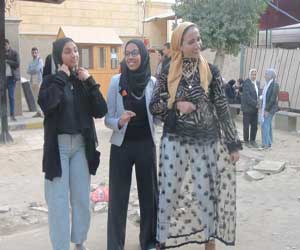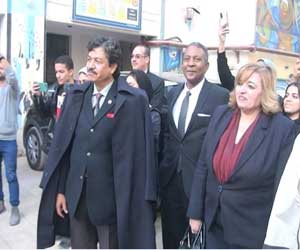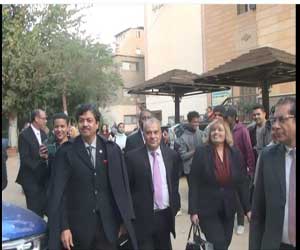Nationalism in the rhythms of Nubian music between the fragrant history and Nubian folk arts...Master thesis at the Faculty of Specific Education
Under the auspices of Prof. Dr. Osama El-Sayed, Dean of the Faculty of Specific Education, and Prof. Dr. Mustafa Kadry, Vice Dean for Graduate Studies and Research Affairs, and Prof. Dr. Ali Hussein Al-Nagar, Professor of Piano and Director of the Arts Center (former), Researcher Rania Fawzi presented a master’s thesis entitled Preparing pieces from the Nubian heritage to acquire some performance skills for the piano.
A variety of Nubian heritage pieces were presented with the participation of Nubian bands, under the supervision of Prof. Dr. Ali Hussein, professor of piano at the faculty, and Dr. Hani Muhammad Al-Gammal, teacher in the department, and the discussion and judgment committee consisted of Prof. Dr. Ali Hussein, professor of piano, Prof. Dr. Ibtisam Makram, Professor of Performance and Vice Dean of the Faculty of Music Education for Community and Environmental Affairs at Helwan University, and in the presence of Ambassador Nagwa Ibrahim, representative of African women in the African Union and many public figures from the Ministry of Culture and Nubian Society, Prof. Dr. Amr Khalil, Vice Dean for Community Service and Environment Affairs, Prof. Dr. Dalia Hussein, Head of the Music Education Department, and Prof. Dr. Heba Assem, Head of the Department of Home Economics at the faculty, faculty staff, the teaching assistants, researchers and students of the Faculty of Specific Education at Ain Shams University.
Prof. Dr. Osama El-Sayed emphasized that this thesis aims to revive identity, deepen nationalism, and consolidate folk arts and heritage, as a Nubian band, in its popular official dress, presented tambourines and musical singing in the Nubian language, to familiarize the community with this music, its rhythms, identity and nationalism, and its wealth of historical and cultural dimensions and events and the impact of this music. The Nubian folk arts as a soft force in the modern era from many angles enrich culture, arts, identity, and nationalism, through the musical rhythms in the Nubian folk arts. It is worth noting that the Nubian language, due to its uniqueness, had a great influence on the victory of the October 1973 war. It was the encrypted language of the armed forces during the war, and it helped to disrupt the enemy, which led to victory in the October 1973 war.
 |
 |
 |
||


.svg)




